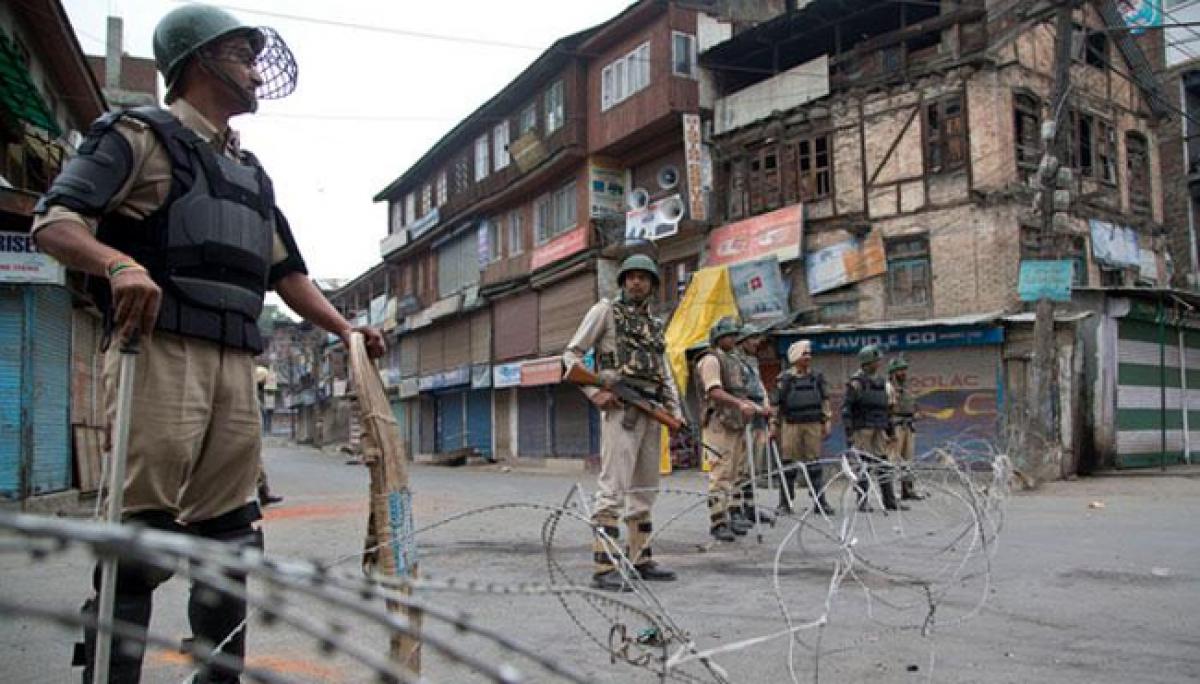Live
- ICC chief Jay Shah meets Brisbane 2032 Olympics organising committee CEO
- Oxford Grammar High School Celebrates 44th Annual Sports Day with Grandeur
- Indian banking sector’s health remains robust, govt policy working very well: Top bankers
- iOS 18.2 Unveiled: New Features with ChatGPT Integration Revolutionize Your iPhone
- 'Run for Viksit Rajasthan' to be annual event, says CM Sharma
- Nitish Kumar launches '109 free medicine vehicles' in Patna
- India have to play their best cricket at the Gabba to win series: Harbhajan
- Income tax refunds jump 46.3 pc to Rs 3.04 lakh crore in April-Nov
- Financial Intelligence Unit detects undisclosed income worth Rs 11,000 crore in 2024: Centre
- Odisha BJP chief to be elected in January
Just In

Apprehensive that the ongoing violent unrest may prolong - as in 2008 and 2010, the Jammu and Kashmir government has quietly reached out to separatists, seeking their help to calm anger on the streets following the killing of a top Hizbul Mujahideen commander, informed sources said on Friday.
Apprehensive that the ongoing violent unrest may prolong - as in 2008 and 2010, the Jammu and Kashmir government has quietly reached out to separatists, seeking their help to calm anger on the streets following the killing of a top Hizbul Mujahideen commander, informed sources said on Friday.
However, none in the separatist leadership has agreed to engage with the government of Chief Minister Mehbooba Mufti amid the current volatile situation that has left 38 people dead and over 1,500 injured in the last one week, the sources told IANS.
They said emissaries were sent to Syed Ali Shah Geelani and Mirwaiz Umar Farooq - chairmen of the respective hardline and moderate factions of the divided separatist conglomerate Hurriyat Conference.
The government also tried to establish contact with Yaseen Malik -- head of the Jammu and Kashmir Liberation Front (JKLF) - lodged in a Srinagar lockup.
But, the sources said, none of them have agreed to ask people to calm down or call off their protests in the wake of civilian killings in firing by police and paramilitary forces.
"They (separatists) have expressed their helplessness, saying they are not in control of what is going on in the valley," one of the sources told IANS.
The separatist leaders, according to the source, have demanded from the government to lift curbs on them, remove curfew and allow them to hold protest marches before they "can issue appeals for peace".
However, the government has not agreed, fearing that if protest marches were allowed at this juncture, the situation may spin out of control.
On July 10, when the unrest was still building up, the government's chief spokesperson and senior Cabinet minister Naeem Akhtar had publicly said that "we need the support of the Hurriyat Conference" to end the crisis.
Geelani and the Mirwaiz - both detained in their houses - have in separate interviews to IANS said they were not in control of the situation as the current wave of violent protests in the Kashmir Valley was "spontaneous and not sponsored".
Some political experts, who spoke on condition of anonymity to IANS, said the hands-off approach of the separatist leaders indicated they have "no" or at the most "very little" sway over the situation right now.
"It is sort of a leaderless mass of frustrated Kashmiri youth who are pitted not only against the State but also against themselves. They don't care about the physical losses they incur by throwing stones to attract live bullets," a university professor told IANS here.
He said "these youth were enraged at the government and enthused by a false vigour of self-righteousness (jihad) and they are rampaging on everything.
"If anybody tries to sort of control them, they would turn against him or her. I don't think separatist leaders can afford that."
But another political expert, who has in the past been in the separatist camp, said: "The anti-India resistance leadership cannot afford to let the situation slip into absolute chaos.
"We already have nearly 40 dead in six days. After sometime the martyrs become mere numbers. The situation has escalated to separatists' advantage. It has to and will de-escalate for sure. But then they (separatist) won't have the advantage to bargain. Therefore, I think it is time for them to engage with the government, secretly or otherwise, and try and take control of the situation on the streets."

© 2024 Hyderabad Media House Limited/The Hans India. All rights reserved. Powered by hocalwire.com







